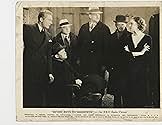A writer, looking for some peace and quiet in order to finish a novel, takes a room at the Baldpate Inn. However, peace and quiet are the last things he gets, as there are some very strange ... Read allA writer, looking for some peace and quiet in order to finish a novel, takes a room at the Baldpate Inn. However, peace and quiet are the last things he gets, as there are some very strange goings-on at the establishment.A writer, looking for some peace and quiet in order to finish a novel, takes a room at the Baldpate Inn. However, peace and quiet are the last things he gets, as there are some very strange goings-on at the establishment.
Photos
- Second Deputy
- (uncredited)
- Deputy
- (uncredited)
Storyline
Did you know
- TriviaFifth of six films based on the same novel and play - three silents and three "talkies" released from 1916 to 1947.
- GoofsWhen Magee escapes with the money through a hidden compartment in the house; he goes to Mary's room and knocks a few times on her door. However, there is no audio heard of him knocking on the door.
- Quotes
Mrs. Quimby: [talking about Lem Peters, the hermit] ... But I know his wife run off with a musician used to play here in the hotel band.
William Magee: Hmm, that's bad.
Elijah Quimby: A saxophone player.
William Magee: Mmm, that *is* bad.
- ConnectionsReferenced in Snowed Under (1936)
'Seven Keys to Baldpate', which Cohan adapted from a novel by Earl Derr Biggers -- now remembered as the creator of Charlie Chan -- is the only Cohan play which is still revived with any frequency. Even this one is squeaky and creaky. The story has been filmed (to date) *seven* times under its original title, with some disguised remakes such as 'House of Long Shadows' and Gene Wilder's wretched 'Haunted Honeymoon' (which ripped off its one and only funny gag from the unjustly obscure comedy 'Murder, He Says').
This 1935 edition is probably the best film version, which isn't saying much. It modernises the material somewhat, deviating significantly from Cohan's original play. Gene Raymond portrays a novelist who comes to the old abandoned Baldpate Inn so as to get some peace and quiet while he writes a novel. He expects to be left alone because he possesses the one and only key to Baldpate ... so nobody else can get in. But then a succession of oddball characters show up, each one weirder than the last ... and each one possesses what he or she claims is the one and only key to Baldpate.
There's a 'surprise' ending that's quite obvious, especially if you've seen 'Haunted Honeymoon'. The best performance in this 1935 movie is by Henry Travers, as a crusty hermit who's misogynistic with it, and who is busy writing a manuscript denouncing womankind. 'Hey, mister!' he shouts, interrupting just as Gene Raymond is about to smooch bland leading lady Margaret Callahan. 'If I start a sentence with the word 'women', do I *hafta* use a capital W?' That's a typical example of the weak humour on offer here.
Cohan's original play ended with a startling piece of meta-fiction, a coup de theatre in which we learn that the events we've just witnessed are actually the contents of the novelist's manuscript, which he has already written. It would have been an improvement if this 1935 film version had attempted something like that, instead of the flat obvious ending which this movie has. I'll rate it 3 out of 10, mostly for its fine cast of supporting actors.
- F Gwynplaine MacIntyre
- Jan 16, 2005
- Permalink
Details
- Runtime1 hour 20 minutes
- Color
- Aspect ratio
- 1.37 : 1
Contribute to this page



























